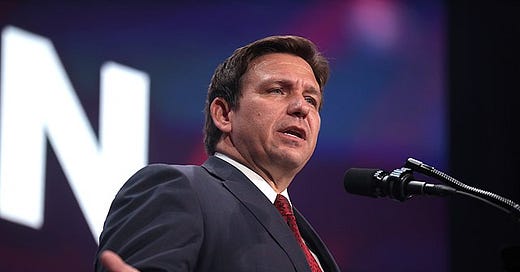The Psychology of Name-Calling on the Campaign Trail
Why Donald Trump's snarky nicknames stick - and undermine his rivals.
Last month, it was widely reported that former President Donald Trump was “workshopping” nicknames for Governor Ron DeSantis, an anticipated opponent in the 2024 Republican presidential primary.
By March, Politico and Bloomberg claimed that Trump seemed set on “Ron DeSanctimonious,” but had also considered “Ron DisHonest” “Ron DeEstablishment,” or perhaps, “Tiny D.” New York magazine went on to rank eight of Trump’s possible derisive monikers for the Florida governor, giving the number one spot to “Meatball Ron.”
1. Meatball Ron
Usage: Trump has never publicly called DeSantis “Meatball Ron,” and, tragically, it’s possible he never will. The New York Times reported in February that Trump “has insulted Mr. DeSantis in casual conversations, describing him as ‘Meatball Ron,’ an apparent dig at his appearance.” Days later Trump repudiated the nickname in a Truth Social post, saying it’s “inappropriate.”
With so much speculation around what Trump will call DeSantis, let’s explore the psychology of why his cruel nicknames stick - and could help him win.
* * *
Back in early 2016, I remember chatting with a friend in neuropsychology about the upcoming presidential election. By then, Donald Trump had become accustomed to referring to his opponent, Hillary Clinton, as “Crooked Hillary” in reference to her use of a private email server while serving as President Obama’s secretary of state.
“The name-calling is all so ridiculous,” I sighed. “He’s acting like an elementary school bully.”
My friend shook his head, warning me not to be so dismissive. From his perspective, Trump was employing a clever strategy grounded in research.
From that point on, I paid closer attention to the 45th president’s growing list of nicknames for rivals and enemies. “Little Marco.” “Crazy Bernie.” “Low Energy Jeb.” “Lyin’ Ted.” “Sloppy Steve.”
Yes, they were memorable. But harmless, right? Well, maybe not.
Associative learning is a process responsible for how we come to anticipate one event or feeling from the occurrence of another. For example, when we see lightning, we expect thunder. In other words, we become accustomed to signals associated with specific expectations, and these inform our behavior.
This phenomenon can work in other ways as well. When Trump calls his opponents mean-spirited nicknames repeatedly, he is associatively linking them with negative emotions.
As experimental psychologist Edward Wasserman explains:
“[Trump’s nicknames] hijack the learning process and prevent voters from more carefully considering all of the strengths and weaknesses of the candidates’ personal qualities and policy positions.”
There’s more to associative learning, but a key point is that derisive monikers can have a tangible effect. Repetition can also lead to better memories of the association that are retained for a long time.
All of this means when we hear Trump disparage political opponents with the same snarky nicknames, over and over, we may begin to associate the people he’s referring to with negative feelings without intending to. So while it’s easy to view the former president’s name-calling as merely immature, it could have real consequences on Election Day.
Many of us remember being told as children that verbal bullying can’t harm us. There’s the popular rhyme, “Sticks and stones may break my bones, but words shall never hurt me.”
But science suggests that lesson isn’t always true. And for Donald Trump, name-calling has served as an effective way to undermine his rivals. It might not always lead him to victory, but over time, it’s been a strategy that works.





So the corollary question becomes, "what nick names for Mr. Trump might stick and cause voters to associate him with negative ideas or words?" I don't consider myself particularly skilled in that sort of thing, but candidates might include:
1) Trump the Frump, relating to his antecedent's name before it was changed.
2) Knife edge Don, relating to his ability to skate close to the edge of legality (bankruptcy, voting laws, etc.), also implying he is a criminal with a knife and the associations that go with that.
3) Ditzy Don
4) Difficult Don (hard to work for, or work with?)
5) Deranged Don (for those who have Trump derangement syndrome - TDS)
6) Demented Don
7) other options????